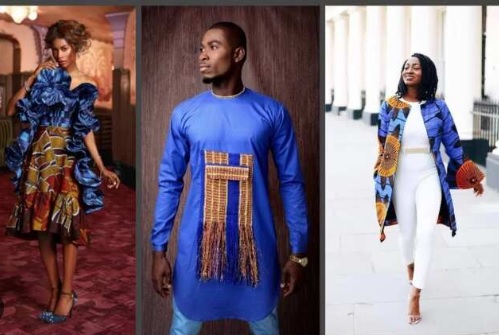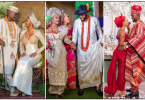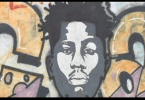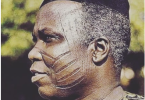Fashion is Art – an expression of beauty, and unique worldviews. Nowhere are these unique worldviews and beauty so vividly expressed, as is found in diverse forms of African art and fashion. And surely, Nigerian fashion designers have worked their way up to become foremost ambassadors of African culture, through numerous forms of creative self-expression.
The Origins of Nigerian Fashion
Nigerian fashion evolved out of centuries-old, and numerous fashion styles birthed out of the many ethnic tribes of the nation. Each ethnic group developed its own art and fashion over the generations, a curious combination of hair styles, materials, colors, designs, and accessories. Much of these ethnically distinct forms of Nigerian fashion were largely influenced by the local climatic conditions, available materials, religion, and social class. Other factors indigenous to each tribe and its unique environment over time could have been thrown into the mix.
However, we know from experience that many of these tribal groups interacted and influenced one another over time – even fashion-wise. Dyeing of clothes, tattoos, and hair styles, are amongst such cross-cultural fashion trends. This mutual influence is even more vivid in modern Nigerian fashion, as eager fashionistas now wear native clothing and designs inspired by other ethnic groups. Notable cross-cultural African cloth materials in this category include Kente, Aso-Oke, Batik, and Tie-and-Dye. Some semi-modern fabrics such as Ankara, Senator, George, Lace, Suede, Atiku, and Kampala.
Nigerian fashion pieces are also renowned for their elegance; beautiful combinations of color, pattern and cut; with strong demonstrations of creativity. They keep evolving and blending with modern styles from around the world, but nevertheless retaining the distinct cultural identities that produced them. You can trust any typical Nigerian man or woman of the modern day to dress drop-dead gorgeous in their native attires. Social class is not much of an inhibition. And the rave for weekend parties (nicknamed ‘Owambe’ by the Yorubas) and group/family attire (called ‘And-Co’ or ‘Aso-Ebi’, also Yoruba) are another inspiration. These trends seem to inspire unending fashion creativity in modern Nigeria.
Modern Trends in Nigerian Fashion
In the fashion industry, we know the old never truly goes out of style. They only return and become reinvented. As such, iconic native dresses such as ‘Iro and Buba’, ‘Agbada’; ‘Dashiki’; Boubou; cut-and-sew skirt and blouse (in myriads of exciting styles); fashionable head ties; beads; ‘Isiagu’ and Senator tops; native embroidered/beaded hats and caps (for men); double-wrappers and loincloth (of southeast and south-south regions) refused to go out of fashion. Now, the materials used for them are more refined, lighter, and with more beautiful designs.
Yet again is the tradition of dressing in matching or harmonious colors of shoes, bags, head tie and accessories to complement the main cloth material. It evolved in Nigeria’s seventies era; and it continues to improve by the day. The mini-skirts, palazzo trousers, bell-bottom and skinny jeans, ballet shoes, headscarves and turbans that emerged in the nineties are also here to stay, no doubt.
Another trend that reemerged with a twist is the natural hair look. Unlike the sixties’ well-combed Afro hair, the natural look of modern Nigeria has surprisingly adopted the rave for dreadlocks. Some folks prefer to make their natural hair into dreadlocks. While some others buy the factory-made artificial dreadlocks and attach it to their hair; they may even have them tinted with color.
Additionally, cornrowed/woven, braided, and threaded hair styles are simply going nowhere. Lots of young men are even spotted with dreadlocks (and cornrows) these days. Now these styles are more refined – in the form of Ghana weaving, twisted hair, and threading using artificial hair extensions of various kinds and colors.
Nigerian Fashion Designers and Fashion Shows: Fashion Tourism Extravaganza
A wave of fashion designers has evolved out of Nigeria, who have succeeded in taking the cultural fusion agenda seriously. They have become experts in combining traditional and modern Nigerian patterns and styles. They even go beyond the Nigerian landscape to borrow ideas from African neighbors time and again. And no – they are not the least shy to showcase their creativity to the world. These self-appointed cultural ambassadors of Nigeria have carved out a niche for Nigerian fashion on the world stage. Thus, they have contributed to cultural preservation through fashion.
Such designers have put the rich cultural heritage and diversity of Nigeria on global display, while incorporating modern fashion trends successfully. Their creative and innovative designs are eye-catching, quite appealing to both local and international audiences. They have encouraged healthy cultural exchange, and appreciation of Nigeria’s local talents across continents as well.
These are the likes of Deola Sagoe, Lisa Folawiyo, Mai Atafo, Lanre da Silva, Frank Oshodi, Folake Coker, Ituen Basi, Ade Bakare, Zizi Cardow, and Toyin Lawani. They have graced international fashion shows with their designs and models, much to the delight of some big fashion brands. Their creativity has inspired international fashion houses to invite them into collaborative work. Thus, they have further promoted Nigerian fashion and design ideas on the global scene.
Even more uplifting is the upsurge in the number of fashion shows, fashion weeks and events taking place across Nigeria. Some notable fashion events in Nigeria are now a seasonal feature that bring together fashion designers, enthusiasts, and models from around the globe. They include (but not limited to):
- Africa Fashion Week
- Lagos Fashion Week
- Abuja Fashion Festival
- Arise Fashion Week
- TOZALI – Africa fashion and Cultural Week Abuja
- African Bridal Fashion Week
- Art Meets Fashion Abuja
- Nigeria Fashion Week
- GTCO Fashion Weekend
These fashion events contribute immensely to the growth of Nigeria’s fashion industry. They offer huge dimensions of exposure, and opportunities for international recognition and collaboration, to Nigerian fashion designers and garment makers.







